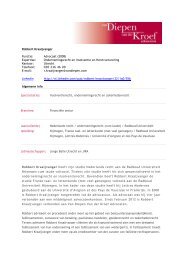© Van Diepen Van der Kroef Advocaten
© Van Diepen Van der Kroef Advocaten
© Van Diepen Van der Kroef Advocaten
- No tags were found...
You also want an ePaper? Increase the reach of your titles
YUMPU automatically turns print PDFs into web optimized ePapers that Google loves.
) leads to a result which is manifestly absurd or unreasonable.’The Association et al. fails to un<strong>der</strong>stand why the District Court in its interpretation ofArticle 105 of the UN Charter did not at least address the question whether the result ofthat interpretation did not lead to a result that was unreasonable or absurd. After all, thevictims of a genocide (which occurred un<strong>der</strong> the eyes of the United Nations, when theUnited Nations had promised protection) were denied every possible legal remedy, and thatwhile Section 29 of the Convention, on which the District Court based its decision,guarantees a legal remedy. The words ‘unreasonable’ and ‘absurd’ are even rathereuphemistic for the situation in which the District Court has placed the victims of thisgenocide. That conclusion serves to justify having recourse to supplementary means ofinterpretation, which in this context are of particular importance for the purposes for whichthe UN was instituted, including the protection of human rights, and thus including the rightof access to justice. Also of importance for interpretation are the circumstances un<strong>der</strong>which the treaty was concluded. One of the cornerstones of the formation was the universaldesire and necessity to prevent genocide in the future. Article 105 paragraph 1 of the UNCharter should not be interpreted in the way that the District Court has done where itshould have been established that the granting of immunity conflicts with the realisation ofthe purposes and leads to the frustration of fundamental human rights.87. The principle that the shield of immunity of an international organization has anunavoidable obverse, namely, the obligation of the international organisation to ensure itsown independent legal remedy, is also expressed in the foreign literature (see for exampleK. Odendahl, in her Article (on the discussion of the decision of 25 January 2005 of theFrench Cour de Cassation in the case Degboe/African Development Bank) ImmunitätInternationaler Organisationen bei Dienstrechtsstreitigkeiten, IPRax 2007, p. 339 – 342, mostparticularly p. 340 righthand column):‘Seitens <strong>der</strong> herrschenden Ansicht in Literatur und Rechtsprechung wird daher mittlerweiledie These vertreten, dass internationale Organisationen nicht nur berechtigt, son<strong>der</strong>n sogarverpflichtet sind, eigene unabhängige Überprüfungsinstanzen zu schaffen, die als Gerichteverbindlich über Dienstrechtsstreitigkeiten entscheiden. Begründet wird die Pflicht damit,dass eine internationale Organisation trotz <strong>der</strong> Befreiung von <strong>der</strong> innerstaatlichenGerichtsbarkeit weiterhin an das Recht, insbeson<strong>der</strong>e auch an die rechtsstaatlichen und<strong>©</strong> <strong>Van</strong> <strong>Diepen</strong> <strong>Van</strong> <strong>der</strong> <strong>Kroef</strong> <strong>Advocaten</strong> page 38 of 99
















